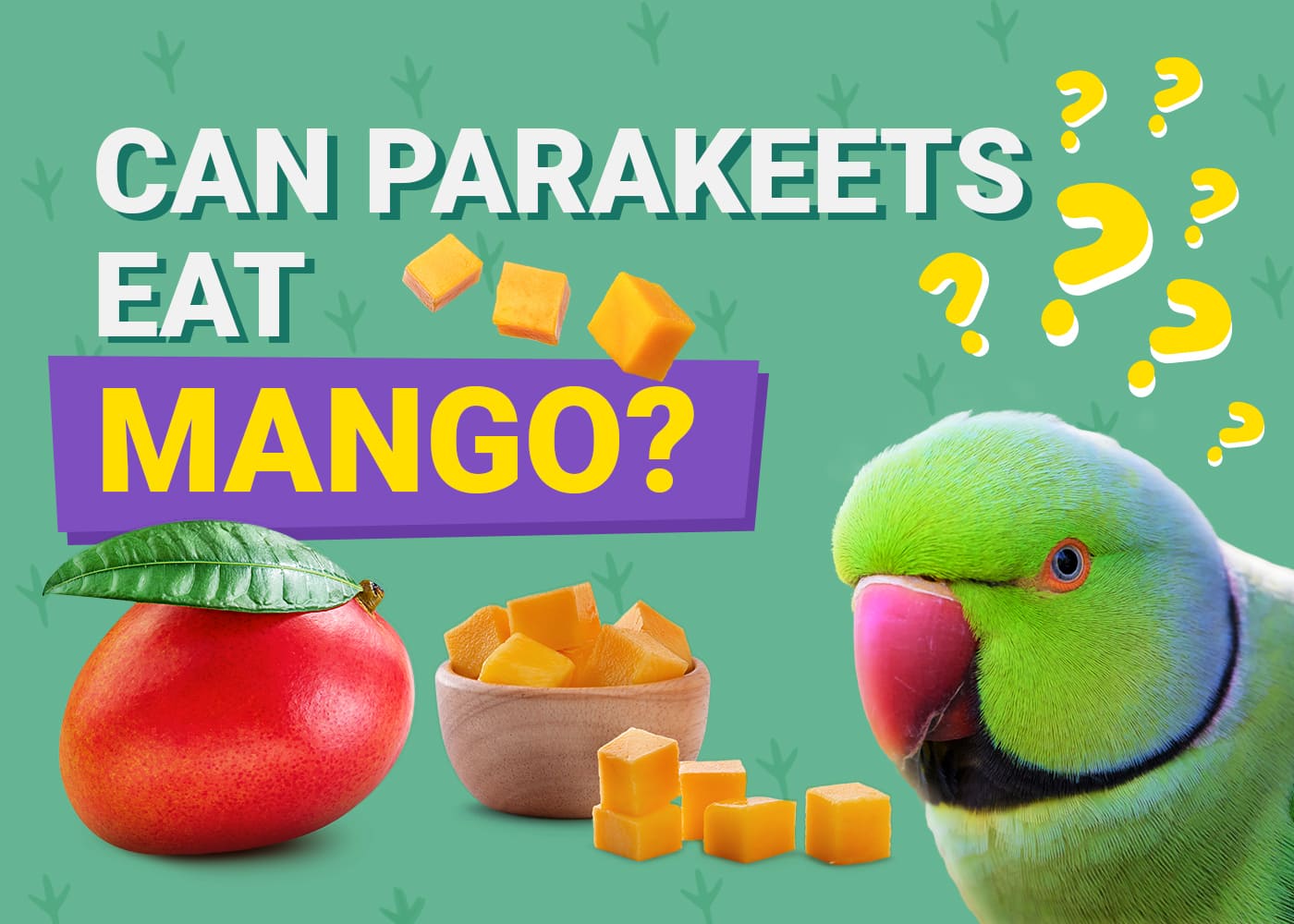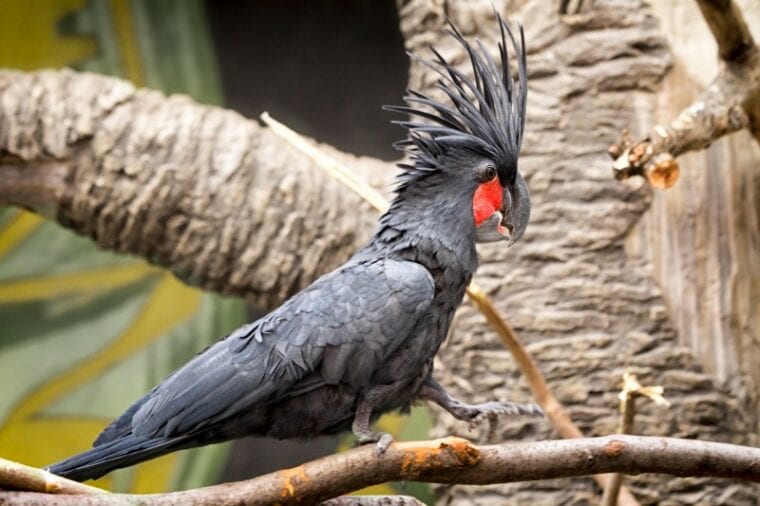
Black-feathered pet birds are not actually that common. In fact, most birds are brightly colored, so finding a more neutral shade like black can be challenging. Most birds that can be kept as pets and have black feathers are rare variants of more popular pet species. You’ll typically have to pay more for these birds, and you may even have to travel a distance to find them.
That said, there are about ten species of black-feathered pet birds you may want to consider adopting. Most of these are a lot of work, and they can be difficult to find.
The 10 Black-Feathered Pet Birds
1. Carnaby’s Black Cockatoo

| Size: | 21 to 26 inches |
| Lifespan: | 40 to 50 years |
As its name suggests, Carnaby’s Black Cockatoo is completely black, making them very distinctive from other types of cockatoos out there. They are also pretty large and have a long lifespan, so be sure to do your research before adopting one. While mostly black, these birds often have white markings on their face and tail. Some are more black than others, of course.
These birds are found natively in the southwestern part of Australia, where they are adapted to coastal regions and close inland areas. Their diet mostly consists of native seeds, especially those from the Eucalyptus tree.
These birds are endangered, so be sure they are legal to own in your area before purchasing one.
2. Red-Tailed Black Cockatoo
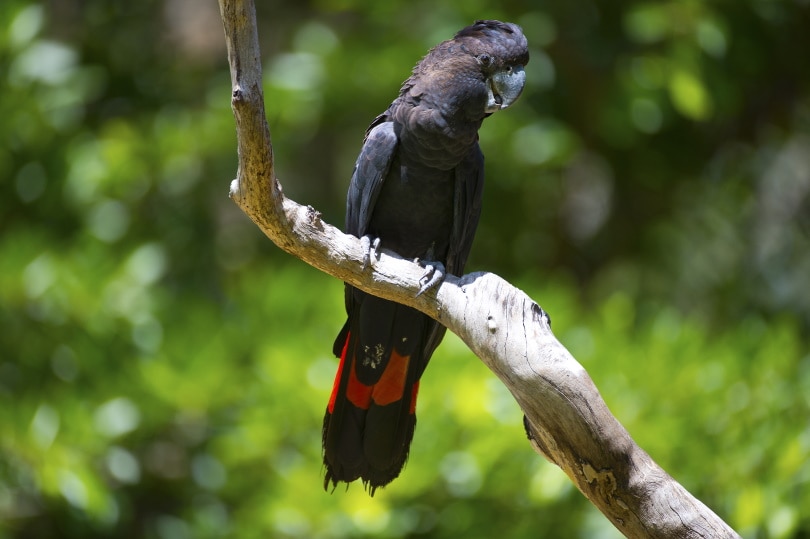
| Size: | 22 to 24 inches |
| Lifespan: | 25 to 40 years |
The Red-Tailed Black Cockatoo actually encompasses several different species which are found in slightly different locations in Australia. They’re known for their mostly black feathers and prominent red panels on their tails. The females may also have yellow markings on their heads, depending on the species.
Like most cockatoos, they eat a variety of seeds, nuts, and fruits, depending on what’s available. These birds are incredibly hard to find in captivity, though they are theoretically legal to have as pets in many areas.
3. Black Finch

| Size: | 4 to 4.5 inches |
| Lifespan: | 5 to 7 years |
There are also many species that can be passed under the name “black finch.” However, the most common species is the Black-headed Munia, which is found in Southeast Asia.
This bird is relatively small and not as social as others, making it a very different sort of pet. They do have a mostly black head, but their body tends to be closer to chestnut brown. The females are less intense in coloring, usually having a more subdued brown appearance.
Once again, these are hard to find in captivity, as they aren’t the friendliest birds. However, that doesn’t mean it isn’t possible.
4. Black-Capped Conure

| Size: | 9 to 10 inches |
| Lifespan: | 20 to 30 years |
These birds are known for their playful and affectionate nature, which makes them fun birds to own. They’ll also be able to perform tricks and mimic sounds like most parrots. Due to their friendly nature, though, they do need a lot of time and interaction from their owners.
You should be prepared to commit a lot of time and attention before adopting one of these birds. Regular mental stimulation is also necessary due to their high intelligence.
5. Black-Headed Caique

| Size: | 9 to 10 inches |
| Lifespan: | 20 to 30 years |
Caiques are known for their playful and energetic nature, making them entertaining pets. Like most birds, they require a lot of interaction and playtime. Therefore, you should only adopt one if you have plenty of time on your hands. They need a lot of out-of-cage time to remain happy and healthy.
They can be quite noisy, so be prepared accordingly. They are not great for apartments or owners who are looking for a docile pet.
6. Black Palm Cockatoo
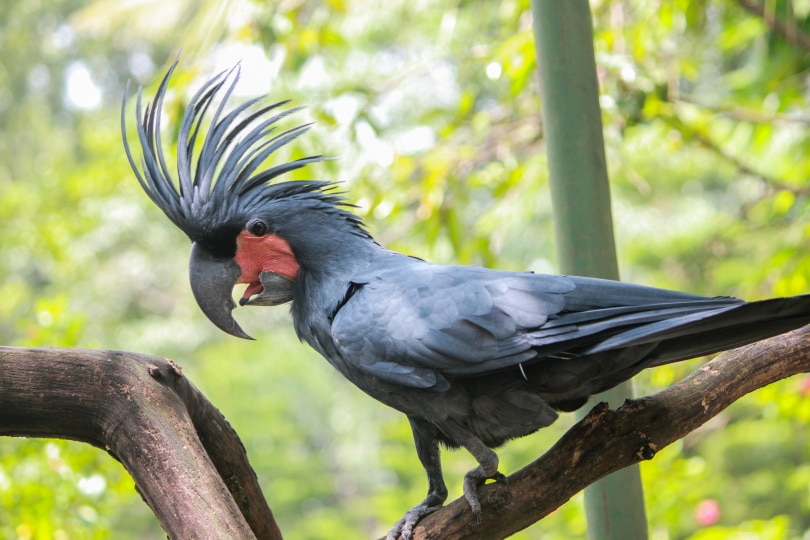
| Size: | 22 to 24 inches |
| Lifespan: | 40 to 60 years |
These cockatoos are pretty large and live a relatively long time. It’s important that you know exactly what you’re getting into before you adopt one, as they tend to outlive their owners by several decades. For the right owner, their impressive intelligence can make these cockatoos a great companion, especially if you’re an experienced bird owner.
Black palm cockatoos do need proper socialization and training to prevent behavioral issues, and a spacious cage is a must. They aren’t perfect pets, but their high intelligence does make them one of the most stimulating.
7. Black Lory

| Size: | 11 to 12 inches |
| Lifespan: | 20 to 30 years |
Black Lories are considered to be medium-sized parrots, so they’re great for those that have less room. They’re known for their vibrant plumage and playful nature, and they enjoy plenty of social interaction. They can be a bit of a handful, especially when you throw their diverse diet into the mix. They’re best for more experienced bird owners. However, if you want a more manageable, smaller parrot, they can be a solid choice.
8. Black-Billed Amazon
| Size: | 13 to 15 inches |
| Lifespan: | 40 to 60 years |
Black-billed Amazons aren’t completely black, but they are black enough for us to add them to this list. They’re extremely intelligent birds known for forming strong bonds with their owners. They also enjoy social interaction and require plenty of mental stimulation using toys and puzzles.
Like many larger birds, they can live a very long time. You should be prepared for an extensive commitment, as most live for several decades.
9. Raven
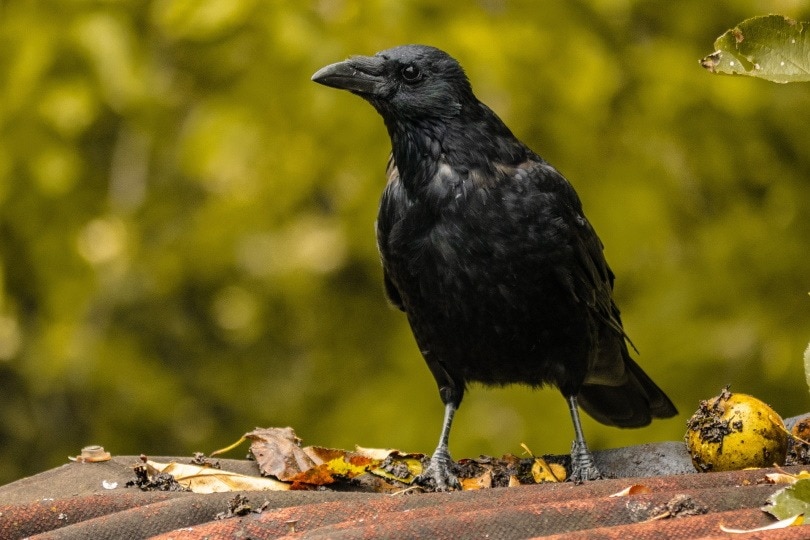
| Size: | 5 to 4 feet |
| Lifespan: | 20+ years |
Ravens are not the most common bird to keep as a pet. However, they are one of the few completely black birds that you can legally own, and they are easier to find in captivity than you may think. They are highly intelligent birds with complex behaviors, and not as much is known about them in a “pet” setting as other birds. Most raven owners dedicate a whole room or outdoor area to these birds, as they require plenty of room to fly around and move.
Preferably, you should have some experience. You should also check that owning a raven is legal in your area, as it isn’t legal everywhere. In some places, you may need a special permit.
10. Black Java Sparrow

| Size: | Around 5 inches |
| Lifespan: | 5 to 10 years |
Java sparrows aren’t very common pets. However, they’re known for their gentle dispositions, making them a good choice for novice bird owners. They’re pretty social birds that typically live in flocks. Therefore, it’s recommended to keep them in pairs or small groups. They’re also smaller, so they take up less space individually.
These smaller birds can be a great starting point for bird keeping, but they are somewhat challenging to find.
Final Thoughts
There aren’t many pet bird species that are mostly black. However, you do have at least 10 options to choose from. Most are suitable for experienced bird owners, but novices should be able to find a species suitable for them, as well.
Be sure you’re ready for the huge commitment before adopting any bird. Birds are a lot of work to keep as pets, as they require lots of socialization and interaction each day. Otherwise, they can develop troublesome behaviors. Many also live for decades. While this means they can be long-term companions, it also means you have to care for them for many years.
See Also:
Featured Image Credit: Elena11, Shutterstock




